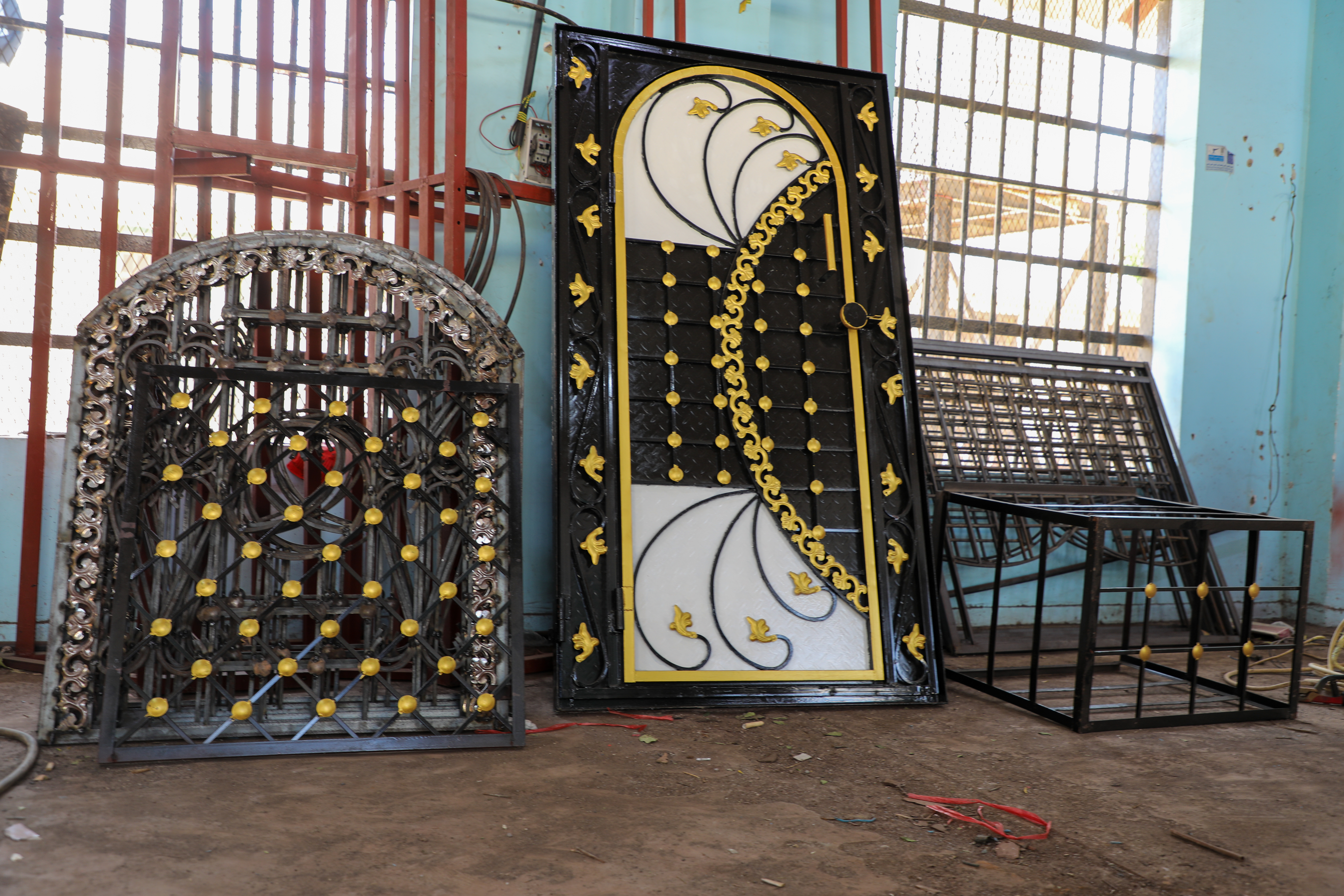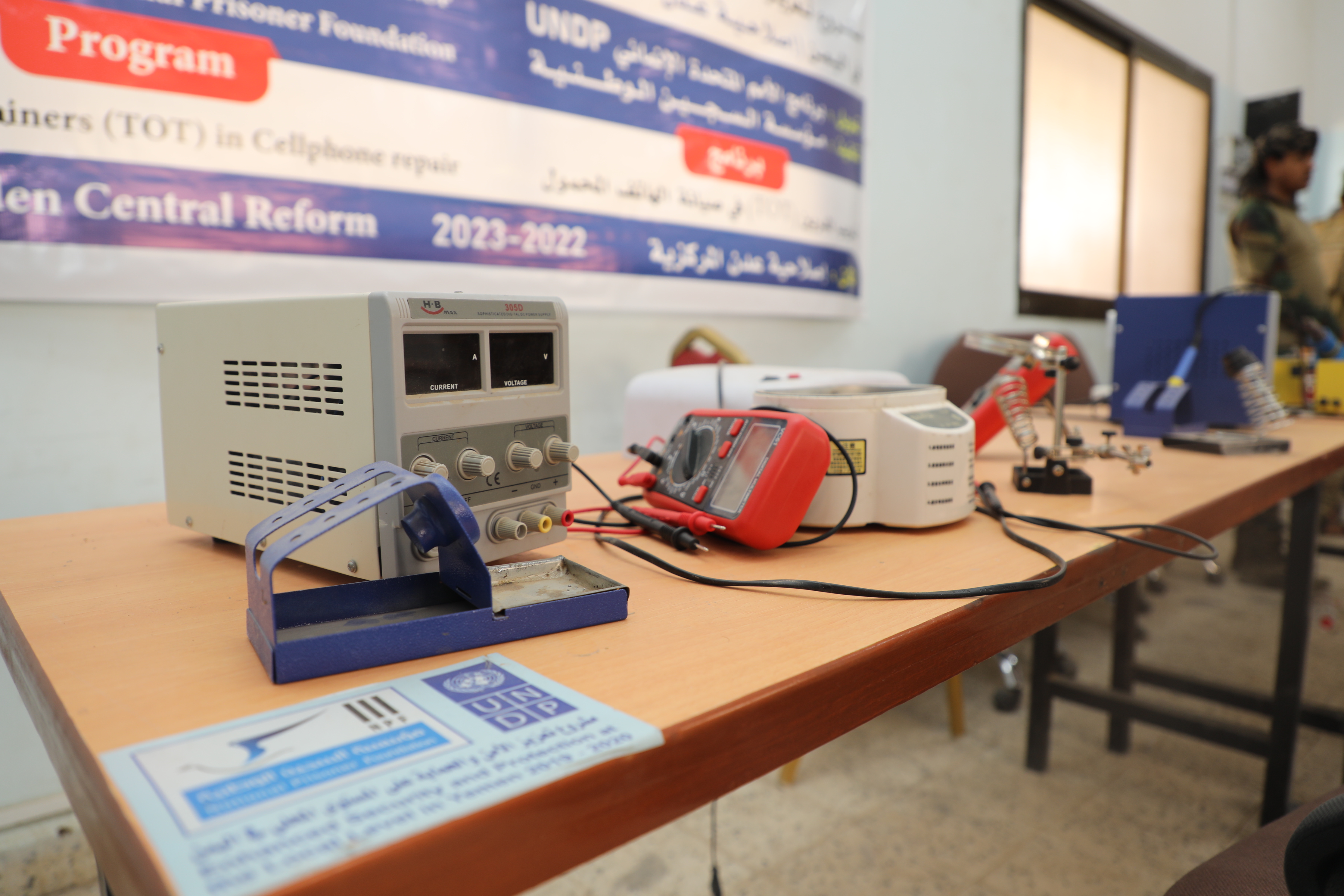Transformative rehabilitation in Aden, Yemen: Spreading hope behind bars
February 20, 2024

A detainee in Mansoura Central Correctional Facility
The sound of metal clanging fills the air as Ali*, a detainee at Mansoura Central Correctional Facility in Aden, carefully puts together an aluminum window. This act is an example of the remarkable changes that have taken place towards capacity building of detainees within the prison walls. Together, the United Nations Development Programme (UNDP) and the Government of the Netherlands are working to enhance restorative justice in Aden through UNDP’s Promoting Inclusive Access to Justice in Yemen (PIAJY) Project.
Ali, sentenced three years ago, had resigned himself to a life of idleness and despair within the confines of his cell. "I was experiencing total depression," he confesses. "My psychological condition was unstable." However, following the development of UNDP-supported vocational training programmes, Ali, along with hundreds of other detainees, received the opportunity to enroll in courses ranging from electrical wiring to computer repair, tailoring, air conditioning, incense making, and many others.
Empowering Detainees, Rebuilding Lives
Waheeb Al Osaili, the prison's Training and Reform Manager, paints a vivid picture of the impact.
"Around 500 detainees benefited from the training courses in 2020, and more than 230 enrolled in vocational training in late 2022," he says. "We have seen many success stories of detainees who managed to get job opportunities when they finished their sentence."

Naqeeb Al Yahari, Mansoura Central Correctional Facility Warden

Waheeb Al Osaili, Training and Reform Manager at Mansoura Central Correctional Facility
In addition to support towards vocational training, UNDP equipped two workshops for training use, one dedicated to metalworks and the other specifically for aluminum craftsmanship, enabling detainees to polish their skills and create remarkable pieces to sell to the public. Furthermore, additional equipment has been provided for air conditioning and refrigeration, expanding the range of potential livelihood opportunities available to the detainees.
"These workshops allow the detainees to receive incomes to support their families, or to pay the fees of their lawyers," Waheeb explains. “The prison administration provides monthly salaries to those working in the workshops.”

Some metalworks crafted by detainees inside Mansoura Central Correctional Facility

A detainee carefully crafts an aluminum window for a customer

Tools used to train detainees in mobile maintenance, empowering them with valuable skills

Detainees learn metalwork skills in the Mansoura Central Correctional Facility blacksmith workshop
More Than Just Skill-Building
“This training helps to ensure detainees are lively and active instead of simply sitting between four walls,” says Waheeb.
Naqeeb Al Yahari, Mansoura Central Correctional Facility Warden, echoes this sentiment: “This project has provided psychological, physical, vocational and technical support to the detainees," he emphasizes.

Children's clothes skillfully crafted by women detainees trained on tailoring in Mansoura Central Correctional Facility
The project's success stories are numerous. One graduate of the car electricity course opened his own workshop following his release. Two women who learned tailoring started their own businesses with machines provided through the PIAJY Project.

Two shops outside Mansoura Central Correctional Facility, one for repairing air conditioners and refrigerators, the other for selling surplus bottled water produced by a water treatment plant
Beyond vocational training, UNDP and prison management have forged a multifaceted partnership focused on holistic improvement. UNDP has constructed a water reservoir and treatment plant that provides 2,500-liters-per-hour, ensuring clean and accessible water for all detainees. Additionally, a cash-for-work programme empowers detainees to contribute to prison maintenance while earning income.
In recognition of the need for market access beyond prison walls, two shops have been established close by. One shop showcases detainees' expertise in repairing air conditioners and refrigerators, while the other sells surplus bottled water produced using the new water treatment plant. This not only provides detainees with income and the prison with revenue, but also serves as a bridge to the community.
"These shops let people see and request services," notes Waheeb.
To prevent labor exploitation and prioritize detainee welfare, comprehensive safeguard measures have been implemented in the prison. A dedicated committee oversees the entire process, conducting surveys to gather detainee feedback on wage disbursement preferences and closely monitoring their work activities. The committee also ensures detainees are provided with safe and appropriate gear to mitigate potential hazards. The goal is to protect detainees' rights and dignity while fostering a secure and fair working environment.
This initiative helps detainees to settle debts, afford legal representation, and support their families – extending dignity to detainees while confined, and opportunity upon their release.

A prison ward rehabilitated through UNDP’s cash-for-work initiative

The new water reservoir in Mansoura Central Correctional Facility
Looking Ahead
Both Waheeb and Naqeeb express their hope for continued collaboration with UNDP. "We aspire for future support... including providing equipment for building blocks and a carpentry workshop," says Waheeb.
Vocational training taking place within Mansoura Central Correctional Facility is a powerful reminder that even in the most challenging environments, hope and opportunity can blossom. It is a testament to the transformative power of rehabilitation and the importance of recognizing our basic need for human dignity. Naqeeb movingly concludes, "There's a human behind the bars."
***
UNDP's Promoting Inclusive Access to Justice in Yemen (PIAJY) project is dedicated to strengthening the resilience of institutions and communities. It aims to foster community safety and security initiatives, facilitate accessible justice, promote gender-inclusive rule of law institutions, and enhance women's participation and leadership in delivering inclusive justice services.
Note:
* Name has been changed to protect his identity.

 Locations
Locations



